Balloon Angioplasty and Stenting for Aortic Coarctation treatment abroad
Treatment prices are regulated by national law of the corresponding countries, but can also include additional hospital coefficients. In order to receive the individual cost calculation, please send us the request and medical records.
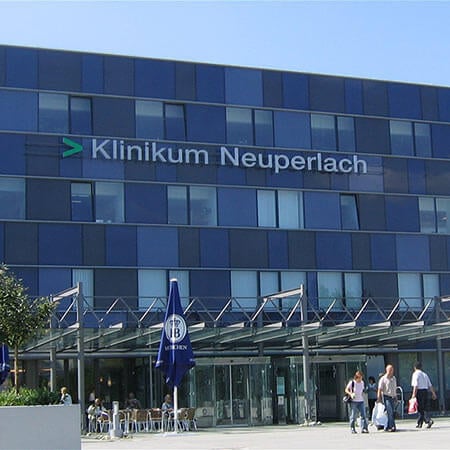
Department of Cardiology and Pulmonology
The Department of Cardiology and Pulmonology provides the full range of diagnostic and therapeutic services for patients with diseases of the cardiovascular system and lungs. In the field of cardiology, key attention is paid to the treatment of valvular heart disease, arrhythmias, heart failure, coronary artery disease, arterial hypertension and aortic diseases. The department's pulmonologists mostly deal with the treatment of pneumonia, bronchial asthma and chronic obstructive pulmonary disease. In addition, the department operates an Intensive Care Unit, within which patients can receive artificial ventilation, renal replacement therapy and procedures for maintenance of blood flow. The department's Chest Pain Unit is certified by the German Cardiac Society and provides medical care to patients with acute coronary syndrome. The department successfully uses in its clinical practice both proven classical treatments and innovative medical achievements, which are available only in leading European hospitals. The department's medical team provides treatment to more than 3,200 patients every year.


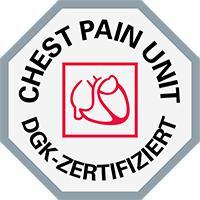
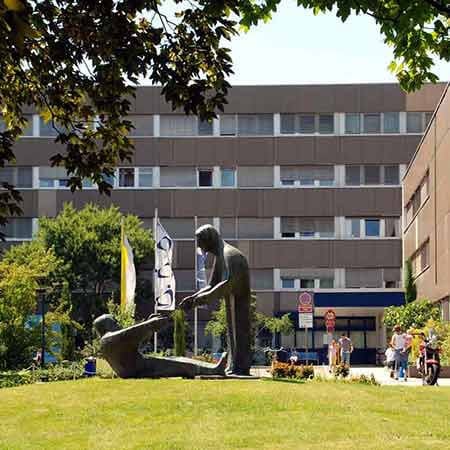
Department of Cardiology and Angiology
The Department of Cardiology and Angiology offers the full range of medical services in the fields of its competence. The department's doctors specialize in the treatment of congenital and acquired heart defects. The key focus is on catheter-based heart interventions, which are characterized by a minimal trauma rate and allow patients to avoid an open operation. For this purpose, the department has three modern Cardiac Catheterization Laboratories. The department also houses an Intensive Care Unit and a Chest Pain Unit for patients with acute coronary syndrome. The medical facility has 82 beds. The department was awarded the prestigious quality certificate from the German Cardiac Society (DGK) for outstanding results in the treatment of mitral valve diseases and acute coronary syndrome. Another important area of work of the department's physicians is comprehensive heart examinations for the prevention of heart disease. For this purpose, specialized Check Up Programs have been developed here, which include an optimal set of diagnostic tests. The medical facility employs a highly professional team of doctors and nursing staff, which makes every effort to provide each patient with effective medical care in a pleasant and comfortable atmosphere.
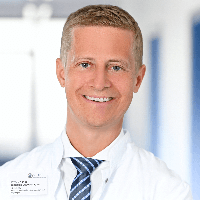

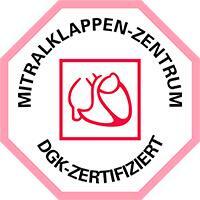
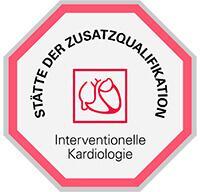


Department of Cardiology and Angiology
The Department of Cardiology and Angiology offers the full range of medical services in the areas of its specialization. The medical facility holds consultations and carries out the diagnostics and treatment of diseases of the heart and blood vessels. The department's team of cardiologists focuses on patients with valvular heart disease, heart rhythm disturbances, coronary artery disease, heart failure, and congenital heart disease. The department has a Chest Pain Unit certified by the German Cardiac Society (DGK) for the treatment of acute coronary syndrome. In the field of angiology, of key interest is the treatment of peripheral arterial occlusive disease, vascular stenosis of various locations, including carotid artery stenosis, and deep vein thrombosis. During the treatment of diseases of the heart and blood vessels, the department’s specialists use various drug therapy regimens and perform image-guided interventional procedures. The medical facility has been recognized with quality certificates for transcatheter aortic valve implantation (TAVI) and treatment of heart failure and mitral valve disease. Patients are treated by highly qualified physicians who strive to restore the patient's health using sparing treatment methods.
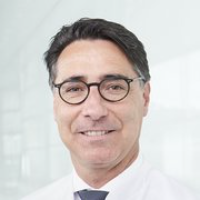





Aortic coarctation is a narrowing of this blood vessel, most often occurring immediately behind the left subclavian artery. This is a congenital heart disease, which is among the critical ones. Without treatment, this condition can lead to the death of a child in the first months of life. Non-critical forms of the defect may cause complications in the future. These may be coronary heart disease, heart failure, aneurysms, aortic dissection, or strokes, and these pathologies develop after the age of 20-30 years.
The heart defect must be repaired promptly to avoid complications. Doctors at foreign hospitals use not only surgical interventions but also minimally invasive procedures such as balloon angioplasty and stenting. On the Booking Health website, you can see the current cost of treatment abroad and choose a medical care program at one of the world's best hospitals.
Content
- Diagnostics
- What are angioplasty and stenting?
- Who may be a candidate for endovascular treatment?
- Endovascular treatment in adult patients
- Endovascular treatment in children
- Palliative stenting in newborn babies
- Where to undergo endovascular treatment for aortic coarctation?
Diagnostics
Aortic coarctation is one of the most common heart defects. It is usually severe, so it is diagnosed shortly after birth. A few days after the child's birth, the ductus arteriosus closes, and this leads to acute hemodynamic decompensation. There are signs of circulatory failure that dominate the symptoms of heart failure. Oxygen starvation causes the dysfunction of all organs, such as the kidneys, intestines, and lungs.
Non-critical aortic coarctation may be detected later in the first years of life or even during adolescence. The condition may be manifested by the following symptoms:
- rapid fatigue;
- weight loss;
- underdevelopment of the lower half of the body;
- elevated blood pressure;
- tachycardia (fast heart rate).
Gradually, the disease enters a phase of compensation. Arterial hypertension becomes the main symptom, but heart failure develops after a few decades.
Clinical and instrumental methods are used for heart disease diagnostics. Blood pressure measurement in the legs and arms helps to suspect aortic coarctation. The difference exceeds 20 mmHg.
Medical imaging techniques help to confirm the diagnosis. Up to 1 year, the main diagnostic method is echocardiography (heart ultrasound). Patients older than one year should also have a chest X-ray. In the case of aortic arch hypoplasia and also if doctors suspect an abnormal discharge of the brachiocephalic blood vessels, computed tomography will be performed.
What are angioplasty and stenting?
In the 20th century, aortic coarctation could only be treated with surgical techniques. But in 1982, a new technique was developed, namely balloon angioplasty. This procedure opened the prospect of minimally invasive treatment without extensive surgical trauma. This procedure proved to be very effective. The desired results are achieved in 78% of cases, and in the world's best hospitals specializing in endovascular treatment of heart and aortic diseases, the proportion of successful procedures exceeds 90%.
The essence of the procedure is that doctors make a short incision in the leg through which they insert a balloon through the blood vessels into the aorta. It is then inflated from the inside by injecting saline with a contrast agent. The procedure is performed under X-ray guidance. The inflating balloon increases the lumen of the blood vessel, normalizing hemodynamics.
Over time, it became clear that balloon angioplasty provided short-term outcomes. Repeated aortic coarctation (repeated constriction) was often a case, the frequency of which reached 83% in the long term. Therefore, the procedure began to be supplemented with stenting. A stent placement in the constriction area prevents repeated coarctation in most patients.
Stenting for aortic coarctation was first used in 1993. This event was followed by the development of many variants of stenting, as a result of which many stent models appeared. This procedure is becoming more and more efficient. The average long-term success rate is 77%, and at the world's best hospitals it reaches 90%.
Who may be a candidate for endovascular treatment?
All patients with aortic coarctation, without exception, need treatment. This heart disease inevitably leads to complications and premature death. The condition is treated immediately after its detection, since some changes that have been caused by hemodynamic disturbances during the period of the absence of treatment are irreversible.
The main directions of treatment are as follows:
- surgical operations include removal of the narrowed section of the aorta and end-to-end anastomosis and replacement of the narrowed section of the aorta with a prosthesis, while bypass surgery (formation of new blood vessels for blood movement around the narrowed site) or isthmoplasty (aortic isthmus dilation with a patch) are less common options;
- endovascular interventions include balloon angioplasty and stent placement in the constriction area; repeated surgery may be done to dilate the stent if the child's aorta has grown as they get older.
Surgery provides the best results in children under 6 years of age, so it is used as a first-line treatment method. In adolescents and adults, endovascular interventions are considered the main treatment option, as they are less traumatic and the results are the same as with surgery.
In addition, endovascular procedures can be used in the following cases:
- repeated aortic coarctation (repeated artery narrowing) after surgery, the probability of which is about 10%;
- as a palliative intervention in newborns to prepare for surgery to reduce mortality and the risk of complications.
Endovascular treatment in adult patients
Aortic coarctation is a severe congenital malformation. The average life expectancy of patients is 35 years.
However, the severity of the defect in different patients varies greatly. It depends on how much the aorta is narrowed and where the narrowing occurred. More often than not, the defect is severe and requires immediate intervention in the first months or years of life. Less commonly, the defect proceeds easily and is detected only in adulthood due to chronic uncontrolled arterial hypertension.
Endovascular treatment can be performed at any age. But as the main treatment option, it is used mainly in adult patients. Their aorta is completely formed and will no longer increase in size, which allows doctors to choose the size of the stent and not perform additional procedures in the future.
Below are the benefits of endovascular treatment:
- a low risk of complications;
- a short hospital stay;
- a high level of treatment tolerability;
- no need for rehabilitation.
Endovascular treatment in children
Balloon angioplasty and stenting can be used in children. This may be a treatment stage for a critically ill newborn or a final treatment. If endovascular treatment is final, the stent will need to be repeatedly dilated with a balloon in the future as the child grows and the aortic lumen enlarges.
The treatment method is effective and safe, which was confirmed by numerous studies. In 2015, a systematic review of 45 studies was published that pooled data from more than 1,000 patients over 6 years of age. As a result, it turned out that:
- following stenting, the diameter of the aortic isthmus increases significantly;
- symptoms disappear;
- blood pressure lowers;
- mortality is 0.4%;
- stent migration occurs in 2.4% of cases;
- the risk of damage to the aortic wall is 0.9%;
- aneurysms develop in 1.5% of cases;
- stent fractures occur in 1.5% of patients;
- the risk of aortic rupture is 0.5%.
Even according to this data, the risk of complications is negligible. It is much lower than during the operation. However, it should be taken into account that the review included patients treated with the endovascular method since the 1990s. Since then, the technique of balloon angioplasty and stenting has improved, and new types of stents have appeared that are more reliable and safe. Patients who will be treated in modern conditions are therefore much less likely to experience complications than those who were treated 20-30 years ago.
At the world's best hospitals, technical success in stenting is achieved in 100% of cases. In 85% of cases, patients completely refuse to take antihypertensive drugs after surgery, and in 92% of cases, good treatment results are maintained for many years.
Palliative stenting in newborn babies
The aorta is very narrow in newborns. It is therefore impossible to implant a stent that can provide long-term results because the aorta will quickly increase in size several times in the very near future.
But in some cases, this procedure can be carried out as a palliative one to stabilize a child's condition who, at the moment, cannot undergo surgery. Critical aortic isthmus narrowing is life-threatening, and hemodynamics in such situations depends solely on the degree of closure of the ductus arteriosus. As long as it remains open, the child is more or less stable, but after it closes, the condition deteriorates sharply.
The ductus can be kept open with prostaglandin E1 preparations whenever possible. But if such a treatment does not work, emergency surgery will be performed. This can be immediately aimed at the surgical repair of the defect. If the child's condition is very bad and they cannot endure the operation, angioplasty and stenting will be performed, and the second stage will involve a surgical procedure.
Where to undergo endovascular treatment for aortic coarctation?
You can undergo your treatment abroad. In developed countries, balloon angioplasty and stenting are effective and safe procedures that can be performed at any age. There are a few reasons for you to undergo treatment abroad in one of the countries offering advanced medicine:
- doctors at specialized centers have vast experience in endovascular treatment of heart and blood vessel diseases;
- the use of state-of-the-art equipment that ensures the technical success of the procedure in almost 100% of cases;
- the use of the latest types of stents;
- good long-term outcomes;
- balloon angioplasty and stenting can be performed at any age, including newborns;
- stent dilation (expansion) procedures are performed in children who have previously undergone endovascular treatment but the results have worsened due to age-related aortic enlargement;
- minimally invasive treatment of heart and blood vessel diseases is carried out with a minimal risk of complications.
You are welcome to use the Booking Health website to find the current cost of treatment at different hospitals and select the best medical care program. The specialists from the Booking Health company will help you to choose a hospital specializing in endovascular treatment of heart defects and take care of the organization of treatment abroad. When making your treatment appointment through the Booking Health service, the cost of treatment will be lower due to the absence of additional fees for foreign patients.
Authors:
The article was edited by medical experts, board-certified doctors Dr. Nadezhda Ivanisova and Dr. Vadim Zhiliuk. For the treatment of the conditions referred to in the article, you must consult a doctor; the information in the article is not intended for self-medication!
Sources:
ECR - European Cardiology Review

